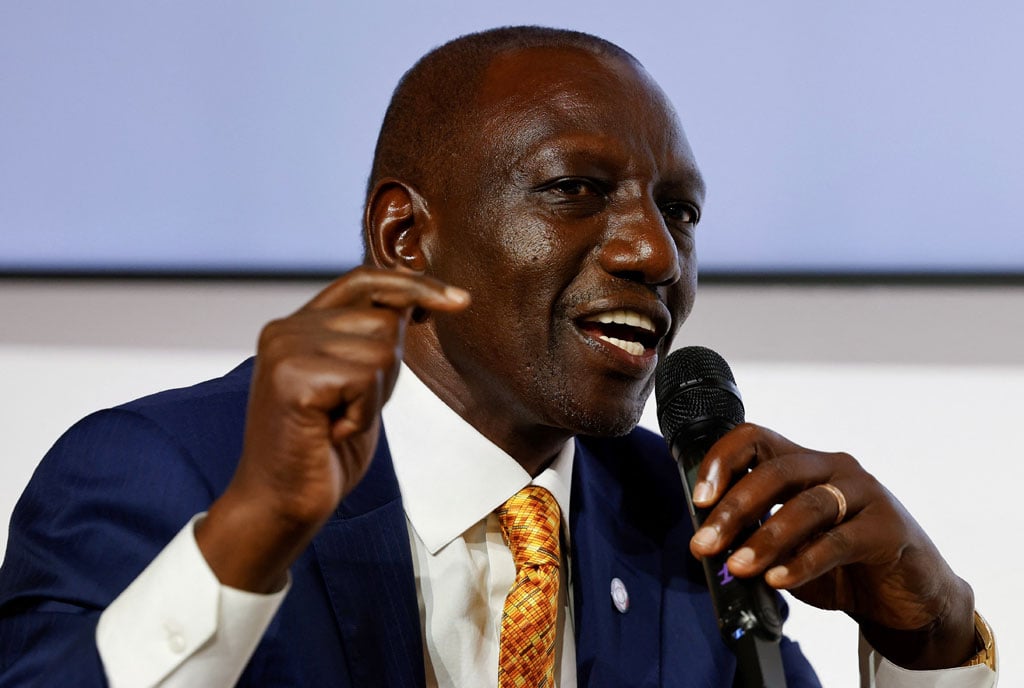Confusion over Kenya’s new travel requirements for EAC

President Museveni and his Kenyan counterpart William Ruto share a light moment at State House Entebbe during a meeting for the Heads of State Summit of the Troop Contributing Countries to the African Union Transition Mission in Somalia (ATMIS) in April 2023. PHOTO/FILE/HANDOUT
What you need to know:
- Citizens of the East African bloc have been exempted from paying application fees for six months
There was confusion among Ugandans, who regularly travel to Kenya, after the Kenyan Immigrations Directorate announced the use of its electronic travel authorisation (eTA) system.
In the statement on the implementation of the eTA signed by Mr Evelyn Cheluget, the director general of the Kenya State Department of Immigration and Citizen Services, indicated that travellers from the East African Community (EAC) states are exempted for six months, which has confused the Ugandan travellers.
“Henceforth, all travellers coming to Kenya will be required to apply for the Electronic travel Authorisation (eTA) prior to travel, with exclusion of the exempted person; citizens of the East African Partner States; These countries include…Uganda. (Exempted for six months),” the statement reads.
The eTA system replaces the visa system in Kenya. Travellers must apply online, at least three days before their travel to Kenya. The application attracts a fee of US$30 (Shs114,000) per visitor.
Kenya started implementing the eTA system on January 1, 2024 to all foreigners except those exempted.
Some Ugandans in Kenya told this publication that they were told that they would be free to operate in Kenya for only six months without any interference even when they have no residence permit.
Mr William Kidima, a leader of Ugandan traders in Mombasa, Kenya, said they don’t know whether they will be required to apply for the eTA after the exempted six months or not.
“The explanation we got from the Kenyan authority is that we will operate freely for six months in Kenya. The details of what will happen after six months isn’t clear,” Mr Kidima said yesterday.
Efforts to get a clarification from the Kenya Interior Ministry officials, including the Permanent Secretary, Mr Julius Bitok, and the communications officer Mr Nixon Ng’ang’a, were futile by press time. Our messages to them went unanswered.
It isn’t yet clear whether Ugandans will have to pay US$30 as application fees after six months’ exemption.
The Ugandans have been travelling to Kenya visa-free because they are citizens of an EAC state. According to EAC treaties, citizens of partner states are allowed to travel within the community without paying for visas.
Some Ugandans interpreted the Kenya Immigrations statement as imposing a fee and tough measures on travellers including those in the EAC.
In the system, a traveller must apply afresh when he or she exits the country. This means if a visitor exits Kenya, he or she has to wait for another three days for the application to be processed.
The visitor may be required to share financial details that prove that he or she will sustain himself or herself while in Kenya.
Those going for medical reasons may also be required to show a letter to the referral hospital or a doctor.
If the visit is business-related, the visitor may be shown an invitation letter from the company in Kenya while those who want to visit their families may be required to provide invitation letters from the host families. The visitor may be required to share details of their accommodation booking in Kenya.
Mr William Busuulwa, the chairman of Uganda National Transport Alliance, said he was told by their representatives in Kenya that Ugandans will continue to use the old immigration system while travelling to Kenya.
“Many of our operators aren’t educated in computer skills. They will have difficulty applying for the new system. Those truck operators cross the border like four times a week,” Mr Busuulwa said.
He said they haven’t yet got a clear picture from both the Kenyan and Ugandan officials.
Our efforts to get a clarification from the Ministry of Foreign Affairs in Uganda were futile.
Telephone calls to the state minister for Regional Affairs John Mulumba went unanswered while Ms Rebecca Kadaga’s, the Minister for East African Affairs and the First Deputy Prime Minister, mobile phones were switched off.
It is estimated that 150,000 Ugandans visit Kenya annually.




